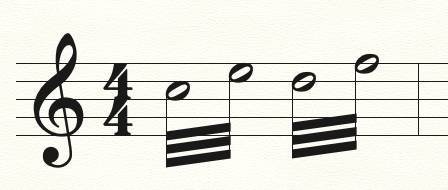
Tom Statler
Members-
Posts
73 -
Joined
-
Last visited
-
Days Won
3
Tom Statler last won the day on September 27 2022
Tom Statler had the most liked content!
About Tom Statler

Contact Methods
-
Website URL
https://sites.google.com/view/tomstatlermusic
Profile Information
-
Gender
Male
-
Location
USA
-
Occupation
Scientist
-
Favorite Composers
Stravinsky, Bartok, Hindemith, Copland, Bernstein, Sondheim
-
My Compositional Styles
Symphonic, chamber; often dense and energetic; usually through-composed, sometimes jazz-inflected
-
Notation Software/Sequencers
Finale + GPO5
-
Instruments Played
Clarinet, Piano
Recent Profile Visitors
The recent visitors block is disabled and is not being shown to other users.
Tom Statler's Achievements
-
-
Nice tune and nice development. Two comments based on one listen: IMO the percussion is heavy and detracts from the overall lyrical style of the piece. I'd like to hear it with the percussion totally silenced; I have a feeling I'd like it more. Also, what's your intent for the clarinets and bassoons at bar 40? The tremolo notation generally means fluttertonguing on winds, which usually results in loss of tone quality and sometimes intonation.
-
Scherzo in D-flat Major for orchestra
Tom Statler replied to Aria Donn's topic in Orchestral and Large Ensemble
Really enjoyed the rhythmic irregularities and the harmonic shifts - you kept me guessing where you were going to go next. I can't remember where I saw a Beethoven scherzo described as going "at the speed of thought" but your piece brought that phrase to mind. One suggestion, though -- how about eliminating the big stodgy rall. right at the end? Just plow headlong into the last bar and keep the energy up all the way! -
tortoise and the hare
Tom Statler replied to Left Unexplained's topic in Orchestral and Large Ensemble
Nice job - I really enjoyed the "hare" writing in the first minute, and the subtle inner-voice glissando around 0:35 is a smart little brush-stroke. I agree with the others that you may have left the tortoise, as well as the story concept, behind after 1:00, but it was fun to listen to. -
A good orchestrator will think about these things in advance and not force the players to decide what notes to leave out or to ask their neighbors to cover for them while they get oxygen. Yes, people do regularly figure these things out for themselves but that shouldn't be an excuse for lazy orchestration.
-
Hraesvelg Third Movement - M16 Eagle Nebula
Tom Statler replied to Syrel's topic in Orchestral and Large Ensemble
I've listened to all 3 movements (are there more coming?) and I'll comment on all three here. I think the 1st movement is the most effective of the set. I feel that it did take me somewhere, and for the most part kept me wondering what was going to be around the next turn. I also think it went on for longer than it needed to (it's out of proportion with the others) and by the time I was about 6 minutes my mind was wandering a bit. But the contrasting coda with the brass was a good touch. Having listened to several of your other pieces, I feel your music is least effective when you get into a repeating cycle of chord changes that happen predictably on the barline. Adding textural variations to something that becomes redundant doesn't make it go anywhere; it's still just static. You're indulging in that a little bit in the second movement, fortunately for not too many cycles. Still, this movement was my least favorite. I liked the third movement, which has the feeling that it should be a culmination, and my only comment here is that it ends before it really accomplishes anything. If this is still a middle movement then maybe it doesn't need to go very much farther; but if it's the last of 3 then I'm left wondering what it was that you were trying to say. -
This is enjoyable to listen to, and it's very much what people would expect from a wind band piece. But as a long-time wind player, I'm very alert to people writing things that are unplayable, and I get particularly annoyed when people forget that wind players have to breathe. As Mark pointed out, the score is really too small to read, but it looks like you're asking a horn player to hold a note for about 70 seconds. And the middle woodwinds are asked to play 16th notes continuously (I think at forte) for about 40 seconds without any gap for a breath. If you're going to write for winds (and I mean actual human musicians and not just a computer simulation) then you have to take these things into account and orchestrate accordingly.
-
Composed vs. "discovered" music
Tom Statler replied to Tom Statler's topic in Composers' Headquarters
So it seems that this is a very subjective thing, and it came as a surprise to me that most of the pieces you all have cited that give you that "discovered" feeling are pieces I don't know, many from composers I've never heard of! But thanks for the listening suggestions - I'll get on that right away. FWIW, some of my examples are the last movement of the 3rd Brandenburg (the whole thing - just pure joy); the spot in the last movement of Beethoven's 5th where the piccolo trill appears; and one of the episodes in the "Street in a Frontier Town" section of Copland's Billy the Kid. (Can't find a score to point to it but if anybody really wants to know I'll time-tag it in an online recording.) It also surprised me that people took this thread as an opportunity to talk about their own compositions, which wasn't the point. Look, folks - we don't get to declare our own music to be perfect. Our music comes out of our own heads, so of course it sounds "right" to us. The issue is whether we are reaching other people, which is for them to determine. -
There are certain moments in certain pieces that sound so completely “right” and natural to me that I’ve long imagined that they weren’t really composed so much as discovered — that they were always there since the beginning of time, somehow hanging in the air, waiting for someone to notice them and write them down. Now, I don’t for an instant think this is literally true. And it’s not the same thing as instantly liking a piece on first hearing. I’m talking about a sense of utter perfection, that of course the music has to be just that and nothing else. The feeling is really strong when it happens. And I wonder, is this something genuine about the music and how it resonates with me at the moment? Or is it just a sense of familiarity and recognition? Maybe I heard this music when I was a very little kid and I don’t remember it, except as a happy experience? Does anybody else experience something like this? What music does it for you? (I’m holding off giving my examples until others chime in.)
-
No worries, Peter. There are any number of works by famous composers that other people can't get enough of that leave me cold. Like, most Mozart, for example. What I love about Janacek is the way he was able to find a totally original - and instantly identifiable - way to speak through the orchestra. He doesn't do development in the Classical sense; he repeats little blocks of melody in different harmonic and textural settings, and it's the evolution of those settings that is the development. As others have said, it shouldn't work, and yet it does. IMO you can't listen to the 3rd movement of the Sinfonietta and not feel like you've been somewhere!
-
Is it appropriate to be a member and
Tom Statler replied to Funkygrl's topic in Composers' Headquarters
I maintain that I am still young in a geological sense and hence qualified for this forum. But seriously, anybody with the willingness to learn from others and to offer honest constructive criticism should be -- and, as far as I can tell, is -- welcome. -
Yes, and there's another aspect that's often forgotten in this era of samples: once you've decided that you need a particular instrument, you've accepted an obligation to give that highly skilled and creative person something worthwhile to do. This varies across the orchestra, of course; nobody expects the tuba to be playing every minute. But if you really need 8 horns for a giant climactic moment, the rest of your piece probably shouldn't be a pianissimo cantilena for strings. I remember playing E-flat clarinet on a graduate-student piece in college, where I sat silent for all but about 20 seconds of the 15-minute duration. It was my only assignment on that concert, and there were entire rehearsals where I literally did nothing because the conductor didn't need to work the fortissimo sections. A colossal waste of time -- and not just mine.




